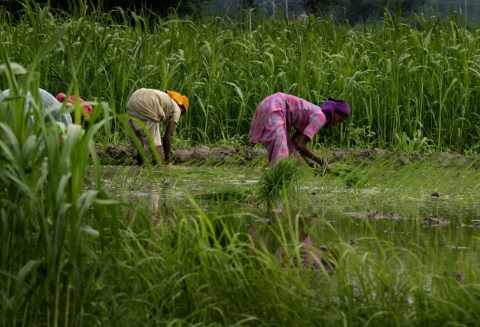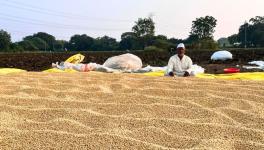Amid Deep Agrarian Crisis, Marginal Increase in MSP of Kharif Crops by Govt

Representational Image. Image Courtesy: BloombergQuint
The Centre on Wednesday announced marginal increase in the minimum support price (MSP) of paddy – by Rs 65 per quintal – making it Rs 1,815 per quintal for the 2019-20 crop year. MSPs have been hiked for 14 major kharif crops.
Though the decision, taken by the Cabinet headed by Prime Minister Narendra Modi, is meant to help farmers at a time when there has been 33 per cent deficiency in Southwest monsoon rains in June, the farmers’ organisations have said that the meagre increase is a stab in the back of farmers.
One of the leading farmers’ organisations, All India Kisan Sabha (AIKS), said in a statement that the announcement only rubs salt into the injury, as the farmers across the country are in acute distress due to severe drought. “It has announced a meagre 3.7 per cent hike in the prices of paddy despite the fact that costs of production over the year have drastically increased,” said AIKS.
Paddy is the main kharif crop, sowing of which begins with the onset of Southwest monsoons. Due to delayed rain, the total area of kharif crops was reduced to 146.61 lakh hectares until last week as against last year's 162.07 lakh hectares, as per the government data.
Read More: The Great MSP Hoax
Agriculture Minister Narendra Singh Tomar said that the increase in MSP of kharif crops for 2019-20 in is line with the principle of fixing MSPs at a level which is at least 1.5 times the cost of production, which was announced last year. Paddy MSP was increased by Rs 200/quintal for the 2018-19 crop year.
Accordingly, the MSP for paddy (common grade) has been fixed at RS 1,815/quintal, while that for paddy of A grade variety has been hiked to Rs 1,835 for this year. The fixed paddy MSP is 50% higher than the cost of production at Rs 1,205/quintal, the minister added.
AIKS said in its statement: “[T]he Commission for Agricultural Costs and Prices (CACP) calculations are questionable and the weighted average costs are arrived at by making drastic undervaluation and are nowhere near the actual costs.”
If we consider the prices during 2018-2019 Kharif marketing season, the variations between CACP costs and projected costs by various state governments are very visible. During 2018-2019 Kharif marketing season, the projected cost for paddy by the state government of Punjab was Rs 2,490 per quintal, whereas the CACP calculation was only Rs 1,174 per quintal, which is not even 50% of the projected costs put forward by the State Agricultural Department.
In Bihar, the C2 costs [C2 cost includes all actual expenses in cash and kind incurred in production by actual owner + rent paid for leased land + imputed value of family labour + interest on the value of owned capital assets excluding land + rental value of the owned land] for paddy is Rs 1,605 per quintal, but CACP considers it to be Rs 1,398 per quintal only. Odisha state government’s projection is Rs 2,344 per quintal, while CACP considers it to be only Rs 1,713 per quintal. So, even if we take the C2 costs that have been calculated by the CACP, which is Rs 1,560 per quintal, the support price – as per the C2+50% formula – would come to Rs 2,340 per quintal. However, the MSP announced is only Rs.1,815 per quintal.
Read More: PM-KISAN: Why Farmers Are Unhappy With Rs 2,000
In case of Tur (pigeon pea), the weighted average C2 cost projected for 2018-19 was Rs 4,981 per quintal. “This also is arrived by similarly deflating the actual costs arrived at by State Agriculture Departments. The MSP announced is way below C2+50% as that would have been at least Rs.7,471.5/Qtl as per 2018-19 projected costs. The MSP announced now is Rs.5,675/Qtl only. This also is below the C2 costs in Karnataka, which is one of the main producers of Arhar/Tur,” added the AIKS statement.
Kerala, on the other hand, procures paddy at the rate of Rs 2,650 per quintal.
“Even when the government announces MSPs, the farmers don’t receive it since the government has no effective procurement mechanisms, except for a few places. So, the farmers are forced to sell their produces for whatever price they get,” said Ashok Dhawale, national president, AIKS.
It is also important to note that the government is increasing the Foreign Direct Investment (FDI) in the agriculture sector, giving a lot of encouragement to the multi-national companies, Dhawale said.
Among the cereals, the MSP of Ragi (finger millet) has been increased by Rs 253 to Rs 3,150 from Rs 2,897 per quintal last year. The MSP of jowar (sorghum millet) has been raised by Rs 120 to Rs 2,550 per quintal for hybrid and Rs 2,570 for Maldandi variety.
MSP for maize has been hiked by Rs 60 per quintal, while that of bajra (pearl millet) has been raised by Rs 50 per quintal to Rs 2,000 for the current year.
In order to reduce edible oil imports, the government has increased the MSP of oilseeds crops sharply this year. The increase for soybean (yellow) is Rs 311, for sunflower seeds, is Rs 262 and for groundnut, it is Rs 200.
Among the commercial crops, the MSP of cotton has been increased by Rs 100-105 per quintal for this year for medium staple cotton and long staple cotton respectively.
The MSPs are fixed to provide price guarantee to the farmers for their produce. This is implemented across the country, as nearly 86% farmers are in small and marginal category.
“If you look the announced prices, MSPs for most of the produces are lower than the prices as per C2+50% formula,” said Dhawale, adding, “As we, AIKS, pointed out earlier, Pradhan Mantri Annadaata Aay Sanrakshan Yojana and Pradhan Mantri Kisan Samman Nidhi were tailored to shirk responsibility off the public procurement and would lead to collapse of the support system. That is what happening now.”
(With inputs from PTI)
Read More: Pradhan Mantri Kisan Samman Yojna: A Misleading Promise
Get the latest reports & analysis with people's perspective on Protests, movements & deep analytical videos, discussions of the current affairs in your Telegram app. Subscribe to NewsClick's Telegram channel & get Real-Time updates on stories, as they get published on our website.
























